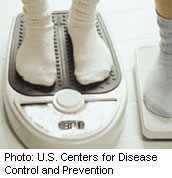- Could Your Grocery Store Meat Be Causing Recurring UTIs?
- Are You Making This Expensive Thermostat Error This Winter?
- Recognizing the Signs of Hypothyroidism
- 10 Strategies to Overcome Insomnia
- Could Artificial Sweeteners Be Aging the Brain Faster?
- Techniques for Soothing Your Nervous System
- Does the Water in Your House Smell Funny? Here’s Why
- Can a Daily Dose of Apple Cider Vinegar Actually Aid Weight Loss?
- 6 Health Beverages That Can Actually Spike Your Blood Sugar
- Treatment Options for Social Anxiety Disorder
Food Rules for Toddlers May Lead to Healthy Eating Habits


Children have healthier diets when their parents place restrictions on what they can eat and train them to control their impulses, a new study suggests.
The University at Buffalo researchers analyzed data from almost 9,000 American children whose self-regulation was assessed at age 2. The children’s diets and parental food rules were then checked at age 4.
“Parents can make a difference here by training young children to self-regulate, and also by setting food rules in the home,” study senior author Xiaozhong Wen, an assistant professor in the department of pediatrics in the School of Medicine and Biomedical Sciences at the University at Buffalo, said in a university news release.
“We found that the combination of parental rules and young children’s ability to self-regulate their behaviors works best in teaching young children to eat healthy,” Wen said.
The study was presented in Boston recently at Obesity Week, the annual meeting of weight-loss surgeons and other obesity specialists.
“In adults and adolescents, self-regulation, emotional eating and obesity have been well-studied, but there is very little information about the role that self-regulation plays in young childhood obesity,” Wen said.
“We found that children who were able to self-regulate at 2 years old had healthy eating habits by the time they were 4 years old, so long as their parents also set rules about the right types of foods to eat. We found that self-regulation by itself, without parental food rules, made little difference in children’s later eating habits,” Wen concluded.
Study co-author Neha Sharma, a recent graduate from the university’s department of psychology, added, “It is amazing to see that a parental rule about which types of food a child can and cannot eat could have such a great impact on child eating habits.”
Sharma suggested in the news release that “without these boundaries set by caregivers, the benefits of high self-regulation on weight gain and childhood obesity could be diminished. This illustrates just how important parental involvement is in influencing child eating habits.”
More information
The U.S. National Library of Medicine has more about child nutrition.
Source: HealthDay
Copyright © 2026 HealthDay. All rights reserved.










